The Mennonite church is at a unique time in history. Currently, women lead three of the four major institutions of higher learning serving the church in Canada. In October 2010, Sara Wenger Shenk began her term at Anabaptist Mennonite Biblical Seminary, Elkhart, Ind.; Susan Schultz Huxman began serving at Conrad Grebel University College, Waterloo, Ont., in July 2011; and Cheryl Pauls took leadership of Canadian Mennonite University (CMU), Winnipeg, last November. The role of president is new to all three of them, and it is the first time these schools have come under the leadership of a woman.
Recently, the three reflected on their calling, gifts and challenges as they lead institutions that shape higher education for Mennonites in Canada.
A call to lead
The previous chapters of their lives have been varied.
Before her call, Pauls served on the faculty of CMU, teaching music theory and practice, and serving in various administrative roles. As a piano soloist, she was active in the new music scene in Winnipeg and beyond. She also participated in congregational worship planning and worship leading. “I care about how things operate, care about how what we’re doing academically extends into the church and the larger community,” she says. “People around me were noticing the things I care about.”
Shenk was a child of missionary-educator parents in Ethiopia, and she and her husband collaborated in an ecumenical theological seminary in the former Yugoslavia for nine years. She has participated in church planting, and has held conference and denominational positions. A gifted teacher, she has authored numerous books and articles on educational and theological topics.
Huxman has been an active scholar in the fields of rhetoric, media literacy and corporate communication. She has held leadership posts in professional organizations as well as in congregational and conference leadership settings. As a member of the Mennonite Education Board (Mennonite Church U.S.A.), she helped in the presidential searches for three other Mennonite schools.
Both Huxman and Shenk see the influence of their families in modelling and encouraging involvement in Christian education. Shenk’s grandfather served as president at what is now Eastern Mennonite University, Harrisonburg, Va., and Huxman’s father served as president of Bethel College, North Newton, Kan. Both women moved from other schools to take on their presidential responsibilities. Shenk served in administration and teaching at Eastern Mennonite Seminary, Harrisonburg, and Huxman was dean of the Elliott School of Communication at Wichita (Kan.) State University.
They speak of mentors who encouraged them to seek positions of leadership within the Mennonite church, and of a process of spiritual discernment around accepting their new roles.
Shenk explains, “I accepted the call to leadership as a sacred trust, joining a team of extraordinarily gifted, spiritually grounded and delightful persons who find great fulfillment in preparing leaders for God’s reconciling mission in the world.”
Leadership gifts
“It is no surprise that many of the required and preferred qualities for a presidential post involve effective communication,” Huxman says, citing inspiring faculty, relating to students, listening to constituents, articulating vision, problem-solving and recruiting students and donors as examples.
As one would expect, all three presidents stress their ability to enjoy people and to develop relationships with them. And, of course, the importance of careful listening. Huxman keeps visual reminders on her desk: a large rubber ear and a prism in a handcrafted ceramic bowl.
“The ear reminds me that I can’t learn anything if I’m talking,” she explains. “The prism reminds me that there are always different ways that people will perceive issues. The ceramic bowl—a gift from an international student years ago—reminds me that community and generosity are values in our Mennonite schools.”
The three enjoy developing strategic plans, working with change and moving their institutions forward towards their goals.
In her former role as a performer of avant-garde music, Pauls developed skills to explain that kind of music to people and to help them see why it matters to their lives. She transfers that skill to explaining the university, interpreting its vision and inviting people to participate in CMU’s vision. She highlights both discipline and imagination as key ingredients in her leadership. “I tend to be perceived as energetic and enthusiastic, and able to involve others in the things I care about.”
Shenk identifies a readiness to face challenges, to set her mind on a goal and pursue it, and to engage actively in problem-solving with others. She is ready to pursue innovation and to imagine new possibilities. “I test ideas in a broadly collaborative, consultative way, and am open to experiment with solutions in somewhat playful, provisional ways to find a way forward,” she says.
Other qualities include being resilient, having a willingness to be authentic and honest in communication, and a desire to live a life of integrity.
Shaping Mennonite schools and education
This is the first time the presidents of these three schools have been women.
“It’s timely that these institutions have been working for a while already at the question of gender balance and affirming women,” reflects Pauls. As married women with children, all three are in a unique position. Huxman cities a Chronicle of Higher Education report in noting that only a small percentage of women administrators in higher education—in the roles of dean, provost or president—are full professors, are married and have children.
She says, “I think female leadership in our high schools, colleges, universities and seminaries sends a powerful message to our current and prospective students that gender is not a barrier to career aspirations, that healthy communities of faith and learning can be led by people who took unconventional paths to their post, and that one way to honour diversity is to recruit and retain women and minorities to positions of authority.”
Shenk recalls that she has experienced excellent leadership by both men and women, with complementary leadership styles. “But, she posits, “it may be that with some heightened mistrust about institutions and church organizations in general, a woman’s relationally attuned leadership style is a welcome, restorative antidote [to a more hierarchical style].”
Job challenges
Both CMU and Grebel are facing the challenge of major capital campaigns. Grebel is in the midst of erecting and raising funds for a building to house additional music, library, archival and community space, at a cost of $8.7 million. CMU is engaged in a $13.9-million campaign for a new library, learning commons and pedestrian bridge. The presidents list other challenges:
- Managing change to programs and facilities in ways that create more excitement than anxiety
- Dealing with the complexity of academic institutions
- Fostering partnerships with church, government, community, business and industry
- Making decisions about work/life balance in a technological world while maintaining a commitment to family life
From her vantage point at the church seminary, Shenk identifies the current “shifting ground” for theological education in today’s world—how theological education is financed, delivered and assessed. “Crisis creates an opportunity to rediscover the firmer ground of our shared mission,” she says.
Finding comfort in difficult times
Huxman mentions humour, prayer, friends and family, sports and the classroom. “These are ‘life-lines’ that ground me, keep things in perspective, and bring me much comfort and pleasure,” she says.
Shenk emphasizes the spiritual grounding that is necessary for her. She feels nurtured by early morning birdsong, Russian Orthodox choral music, words of Scripture, and prayer with the Anabaptist prayer book, Take Our Moments and Our Days.
For Pauls, the simple practice of regularly riding her bicycle to work grounds and invigorates her. Family life is important; she and her husband have two children living at home. She also admits that she gets energy out of most of the things she does at work. “And I am told daily about the people who are praying for me,” she says. “That always gives me energy and brings me to a healthier place with God.”
Gratitude and commitment
Pauls expresses gratitude “for the kind of imagination that has allowed higher education and the church to work together so well and for a long time [and] for the deeper commitment and imagination that has been possible within the Mennonite church.”
“What we’re about is really the mission of God in the world,” says Shenk. “That’s what fills me with gratitude and courage. It’s about Jesus. It’s about the great God of the heavens who comes near to us with tender love, forgiveness and justice for all. That is what we’re each called to testify to through whatever it is we are and do day in and day out—with integrity—in spirit and in truth.”
Virginia A. (Ginny) Hostetler lives in Kitchener, Ont., where she fills a variety of roles: writer, editor, wife, mother, daughter and active member of Stirling Avenue Mennonite Church, Kitchener.
See also:
HIndsight, Foresight, Insight: a Vision for Mennonite Education for Our Times

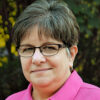
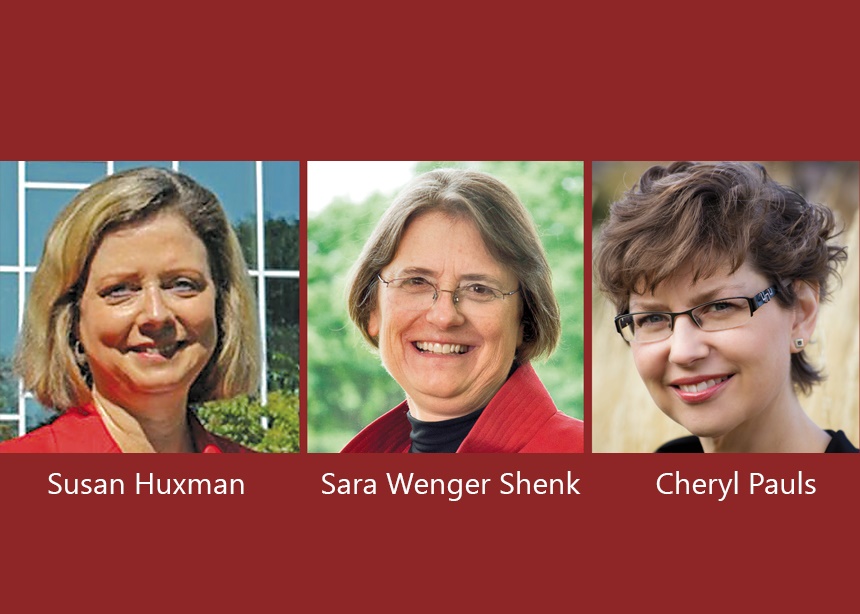


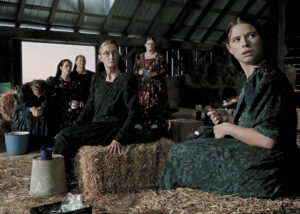
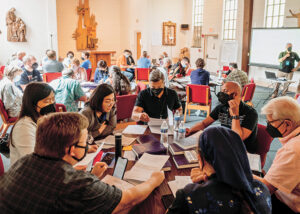
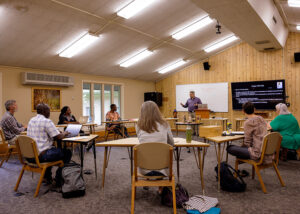

Leave a Reply
You must be logged in to post a comment.